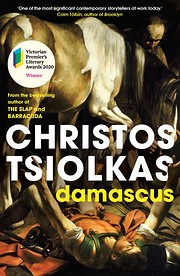

Auf ein Miniaturbild klicken, um zu Google Books zu gelangen.
|
Lädt ... Damascusvon Christos Tsiolkas
 Keine Keine aktuelle Diskussion zu diesem Buch.   ) )One of Australia's foremost writers tackles the story of St Paul, his conversion to Christianity and his subsequent wanderings spreading his version of Jesus' teachings. The story is interwoven with that of his follower Timothy, his early convert Lydia, and the Roman jailer who presides over his final incarceration. The book is particularly good at highlighting the schisms that existed within the early church and the theological differences that already existed between the original apostles and Saul. These differences are widened by Saul's successors, Timothy and Onesimus (called Able here). I was intrigued by how a gay writer would tackle the life of a man whose letters have been a wellspring of much bigotry towards him and others. It's a surprisingly sympathetic portrait, a paradox that the author explains well in his afterword. This book humanizes St. Paul and we see and feel his mental torment. Earthy, sometimes gruesome, and depressing but beautifully written. More a series of vignettes, some treating facets of Paul and another three entitled Faith, Hope, and Love. These last ones concentrate on other characters: Vrasas, Paul's jailer, a devout pagan; Lydia, a Christian convert and her sad life; and St. Timothy, Paul's bosom friend and secretary. A hard book to like but recommended. It’s hard to rate a book one didn’t enjoy. Tsiolkas has to be rated among Australia’s top writers. 5 stars for sure. But this is not a pleasant book. Tsiolkas is the master of gloom and misery. So here is Saul, fleshed out through the Tsiolkas filter. To his credit, he is pretty faithful to the Bible accounts. Even redrawing Thomas as not merely the Twin of Scripture but the actual twin of Jesus, can be enjoyed. The faithful of Tsiolkas’ Damascus are intensely human and struggling with their faith. In that, we have real honesty. keine Rezensionen | Rezension hinzufügen
"'They kill us, they crucify us, they throw us to beasts in the arena, they sew our lips together and watch us starve. They bugger children in front of fathers and violate men before the eyes of their wives. The temple priests flay us openly in the streets and the Judeans stone us. We are hunted everywhere and we are hunted by everyone. We are despised, yet we grow. We are tortured and crucified and yet we flourish. We are hated and still we multiply. Why is that? You must wonder, how is it we survive?' Based around the gospels and letters of St Paul, and focusing on characters one and two generations on from the death of Christ, as well as Paul (Saul) himself, Damascus nevertheless explores the themes that have always obsessed Tsiolkas as a writer: class, religion, masculinity, patriarchy, colonisation, refugees; the ways in which nations, societies, communities, families and individuals are united and divided - it's all here, the contemporary and urgent questions, perennial concerns made vivid and visceral."--Provided by publisher. Keine Bibliotheksbeschreibungen gefunden. |
Aktuelle DiskussionenKeineBeliebte Umschlagbilder
 Google Books — Lädt ... Google Books — Lädt ...GenresMelvil Decimal System (DDC)823.92Literature English & Old English literatures English fiction Modern Period 2000-Klassifikation der Library of Congress [LCC] (USA)BewertungDurchschnitt: (3.35) (3.35)
Bist das du?Werde ein LibraryThing-Autor. |
||||||||||||||||||||||||||||||||||||||||||||||||||||||||||||||||||||||||||||||||||||||||||||||||||||||||||||||||||||||||